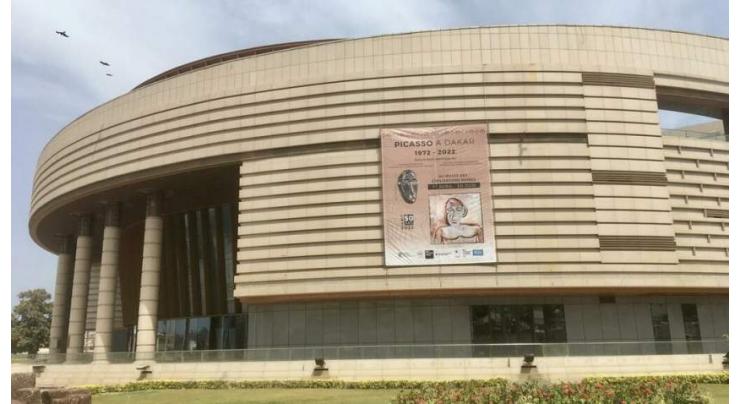
In Senegal, A Rare Pablo Picasso Exhibition
Muhammad Irfan Published April 02, 2022 | 11:18 PM

An unprecedented Picasso exhibition opened this week in Senegal's capital Dakar, where about a dozen of the Spanish master's works are displayed alongside African art, from which he drew inspiration
Dakar, April 2 (APP - UrduPoint / Pakistan Point News - 2nd Apr, 2022 ) :An unprecedented Picasso exhibition opened this week in Senegal's capital Dakar, where about a dozen of the Spanish master's works are displayed alongside African art, from which he drew inspiration.
A pioneering modern artist who died in France in 1973, Picasso left behind a vast and influential body of work including paintings, sculptures and ceramics.
He was one of the founders of the Cubist movement, and was heavily inspired by African art, with the influence notable in seminal paintings such as "Les Demoiselles d'Avignon".
However, Picasso's interest in Africa remains relatively unknown in Senegal.
El Hadji Malick Ndiaye, an art historian and one of the curators of the Dakar exhibition, said that every African should be proud of how the continent's art had inspired Picasso.
Visitors should leave with "a sense of pride in what the continent's artists have given, and in the diversity of styles that have generated new forms and nourished modern art," he said.
The exhibition sees about 15 of Picasso's works hosted in Dakar's Museum of Black Civilisations, on loan from Paris. Alongside them are displayed works of African art, such as otherworldly traditional masks, which so fascinated the influential artist.
- Whistling mask - According to the exhibition curators, Picasso's interest in African art began with a 1907 visit to the Trocadero Ethnological Museum in Paris, which has since closed.
The same year, he painted "Les Demoiselles d'Avignon" -- which features five female nudes, two of whom are depicted with faces that bear striking similarities to traditional African masks.
A study of the painting is on display in Dakar, paired with an African mask appearing to depict a whistling face.
Cecile Debray, the president of the Picasso Museum in Paris, described Picasso as having a "very relaxed relationship to his sources," mixing Romanesque, Iberian and African influences.
The Spanish artist, drawn by the novelty of non-Western artistic traditions, is known to have collected masks and statues from both Africa and Oceania for his studio.
Recent historiography has also highlighted his interest in the spiritual or magical dimensions of such art.
Despite Picasso's interest in Africa, he seldom travelled and never set foot on the continent, according to Debray.
She added that his interest was not solely artistic, however, and that Picasso was a committed opponent of colonialism.
The artist was a friend of Senegal's first president Leopold Sedar Senghor, who staged a Picasso exhibition in Dakar in 1972.
- Relative unknown - An artistic giant in the West, Picasso is a relative unknown in Senegal, a former French colony of 17 million people.
The exhibition organisers are trying to drum up interest by reaching out to schools in Senegal, where about half of the population is younger than 20.
Daouda Sarr, 24, a project management student, told AFP he had heard of Picasso, but thought of him as a French or European artist.
"I was surprised to see that Picasso had done all this around African culture without ever having set foot in Africa," he said during the exhibition's opening on Friday.
Sarr said he preferred the whistling mask to the "Les Demoiselles d'Avignon" painting, "because it is an African mask".
Awa Dia, a 27-year-old who was also at the opening, said that links between Picasso and Africa came as a surprise to her too.
"These are our artists here, they are our ancestors," she said.
Recent Stories

HEC reviews curricula for environmental sciences degree programme

ICC Asia looking forward to an action-packed Asia Cricket Week

Yuvraj Singh named ICC Men’s T20 World Cup 2024 Ambassador

Greece hands Olympic flame to 2024 Paris Games hosts

Two Kyiv hospitals evacuating over feared Russian strikes

World must act on neurotech revolution, say experts

Charles & Catherine's cancer diagnoses

Champions Alcaraz and Sabalenka through in Madrid Open

King Charles to resume some public duties during cancer treatment: palace

US defense chief announces $6 bn in security aid for Ukraine

Heavy rains cause damage to Spezand-Taftan railway track

Woman stabbed in Israel, attacker killed: police
More Stories From World
-
6,000 French police to welcome Olympic torch amid bonus boost
16 minutes ago -
Taiwan hit by several quakes, strongest reaching 6.1-magnitude
36 minutes ago -
'Ballistic' Bairstow stars as Punjab pull off record T20 chase
36 minutes ago -
Tennis: ATP/WTA Madrid Open results - 2nd update
36 minutes ago -
Junta-led Burkina Faso suspends BBC, Voice of America for two weeks
2 hours ago -

Two Kyiv hospitals evacuating over feared Russian strikes
2 hours ago
-

World must act on neurotech revolution, say experts
2 hours ago -

Charles & Catherine's cancer diagnoses
2 hours ago -

King Charles to resume some public duties during cancer treatment: palace
2 hours ago -

US defense chief announces $6 bn in security aid for Ukraine
2 hours ago -

Woman stabbed in Israel, attacker killed: police
2 hours ago -

Israeli-fired unexploded bombs could take 14 years to clear: UN
2 hours ago






